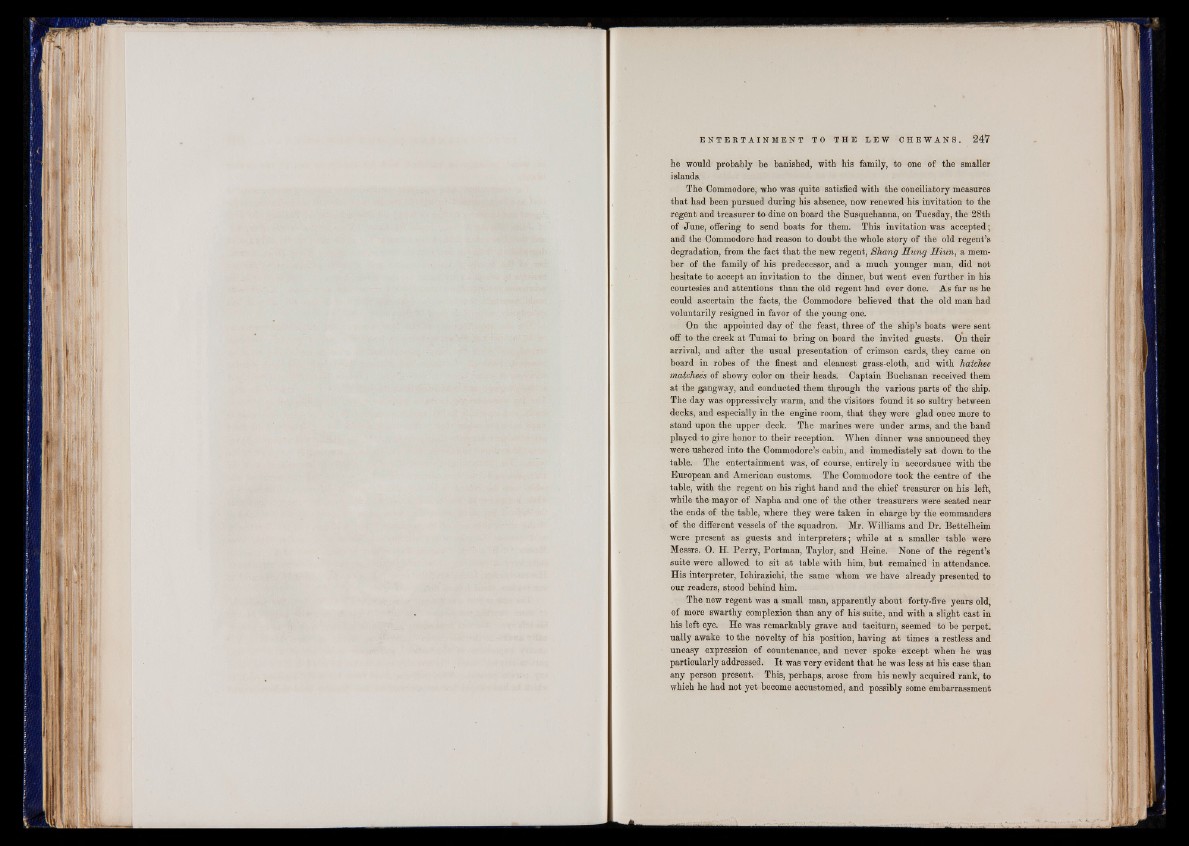
lie would probably be banished, with his family, to one of the smaller
islands.
The Commodore, who was quite satisfied with the conciliatory measures
that had been pursued during his absence, now renewed his invitation to the
regent and treasurer to dine on board the Susquehanna, on Tuesday, the 28th
of June, offering to send boats for them. This invitation was accepted;
and the Commodore had reason to doubt the whole story of the old regent’s
degradation, from the fact that the new regent, Shang Hung Hiun, a member
of the family of his predecessor, and a much younger man, did not
hesitate to accept an invitation to the dinner, but went even further in his
courtesies and attentions than the old regent had ever done. As far as he
could ascertain the facts, the Commodore believed that the old man had
voluntarily resigned in favor of the young one.
On the appointed day of the feast, three of the ship’s boats were sent
off to the creek at Tumai to bring on board the invited guests. On their
arrival, and after the usual presentation of crimson cards, they came on
board in robes of the finest and cleanest grass-cloth, and with hatchee
maichees of showy color on their heads. Captain Buchanan received them
at the gangway, and conducted them through the various parts of the ship.
The day was oppressively warm, and the visitors found it so sultry between
decks, and especially in the engine room, that they were glad once more to
stand upon the upper deck. The marines were under arms, and the band
played to give honor to their reception. When dinner was announced they
were ushered into the Commodore’s cabin, and immediately sat down to the
table. The entertainment was, of course, entirely in accordance with the
European and American customs. The Commodore took the centre of the
table, with the regent on his right hand and the chief treasurer on his left,
while the mayor of Napha and one of the other treasurers were seated near
the ends of the table, where they were taken in charge by the commanders
of the different vessels of the squadron. Mr. Williams and Dr. Bettelheim
were present as guests and interpreters; while at a smaller table were
Messrs. 0 . H. Perry, Portman, Taylor, and Heine. None of the regent’s
suite were allowed to sit at table with him, but remained in attendance.
His interpreter, Ichirazichi, the same whom we have already presented to
our readers, stood behind him.
The new regent was a small man, apparently about forty-five years old,
of more swarthy complexion than any of his suite, and with a slight cast in
his left eye. He was remarkably grave and taciturn, seemed to be perpet.
ually awake to the novelty of his position, having at times a restless and
uneasy expression of countenance, and never spoke except when he was
particularly addressed. I t was very evident that he was less at his ease than
any person present. This, perhaps, arose from his newly acquired rank, to
which he had not yet become accustomed, and possibly some embarrassment